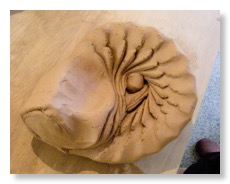Zen and the art of arithmetic
When

Kenneth R Beittel, Zen and the Art of Pottery
Over the holidays I took a pottery course. Our teacher, Jane Sawyer, trained in Japan and introduced us to some classical techniques, beginning with 'wedging' the clay: a strenuous kneading that in her hands produced a beautiful nautilus spiral, but in my hands turned to, well, a knarled lump of clay. But I got a feel for the clay as I rolled and squished and stretched it.
At the potter's wheel, trying to 'centre' my clay I was struck by the centuries of tradition behind replacing the hand with the bowl and got to thinking about tradition in teaching mathematics. Perhaps the 'traditional' algorithms for addition, subtraction, long multiplication and long division are the mathematical equivalent of throwing a pot and teaching these means celebrating our mathematical heritage, joining the long line of those before us who had gone through similar processes.
After lunch, two things made me rethink this reverie. First was when Jane showed slides of Japanese pots, including one of an exquisitely elaborate pot more than 4000 years old. Mathematical algorithms, in that time scale, seem rather less 'traditional' having only been around a few hundred years.
Second Jane mentioned that the hard labour of wedging clay isn't so important now as many potters happily use a machine to do this (which has also opened it up to more women potters). I decided that algorithms are more like wedging than throwing. We have machines that can wedge our calculations, machines that can free us up for the creative part of mathematics: solving problems. We might want children to experience algorithms, to know of their place in the mathematics tradition, but they are not the core of the discipline. And children certainly do not need to spend hours being drilled in them.
As my first wobbly but complete bowl came off the wheel, I felt the same satisfaction that I get from resolving a mathematical problem after several false starts. That's the tradition of mathematics we must pass on.
